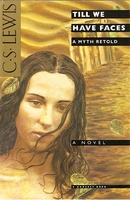Till We Have Faces by C.S. Lewis is a retelling of the Cupid and Psyche myth from the perspective of Psyche's oldest sister.
Istra
is the most beautiful child you can possibly imagine -- sweet and
wholesome as a summer's day. You would think that her older half-sister
Orual would hate her, but quite the opposite is true. Since Istra's
mother died in childbirth and their father the king cares little for his
female offspring, Orual is free to mother and care for Istra. Along
with their tutor, a Greek slave known as the Fox, they wander the
hillsides surrounding the city, happy and free. But all is not well in
the kingdom: there are rumors of war with surrounding nations, wild
animals ravaging the countryside, and now a plague in the city. The
priest of the goddess Ungit casts the lots, and they fall to the king's
household. Istra must be sacrificed, left on the holy mountain for the
Shadowbeast. Orual is devastated to the point of sickness herself. When
she is able to leave her bed, she resolves to go to the mountain and
care for her sister's remains. What she finds there, however, is Istra
alive and healthy. Istra has been living in a small valley high in the
hills, but she claims that it is a castle, though Orual sees only rocks
and bushes. Istra claims that she dwells in her husband's house -- the
house of the god of the mountain. He comes to her at night, and she is
forbidden to see his face. Orual tries to persuade Istra to come home,
or to go into hiding with her, but Istra will not leave her mysterious
lover. Orual eventually convinces Istra to at least light a lamp and see
what sort of creature she has married -- surely, Orual thinks, either
some monstrous beast or else a vagabond living wild in the hills, who
has preyed on Istra's mind, weakened from the trauma of being
sacrificed. Orual is sure that, once Istra sees her bridegroom, she will
return to her sister's care. She waits at a distance, watching in the
night for Istra's light to appear . . .
This is the book I like
to recommend to people who think they know C.S. Lewis. It's much more
nuanced and subtle than the Narnia stories (though, don't get me wrong, I
am an avid fan of those as well), and I would contest that this book is
his strongest literary work, and Orual his best female character by
far. She's both a nurturer and a warrior, both strong and flawed. She's
clever and bitter and not afraid to speak her mind. If you haven't read
this book, either because you haven't heard of it, or because you wrote
off C.S. Lewis for one reason or another, I urge you to go find this
book and read it. Highly recommended.
(Reviewed from my personally purchased copy.)

No comments:
Post a Comment